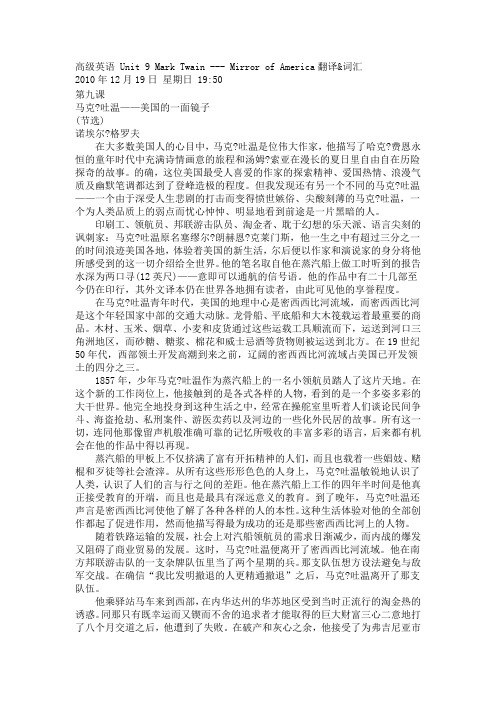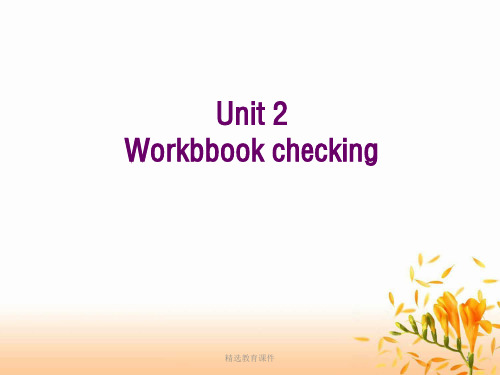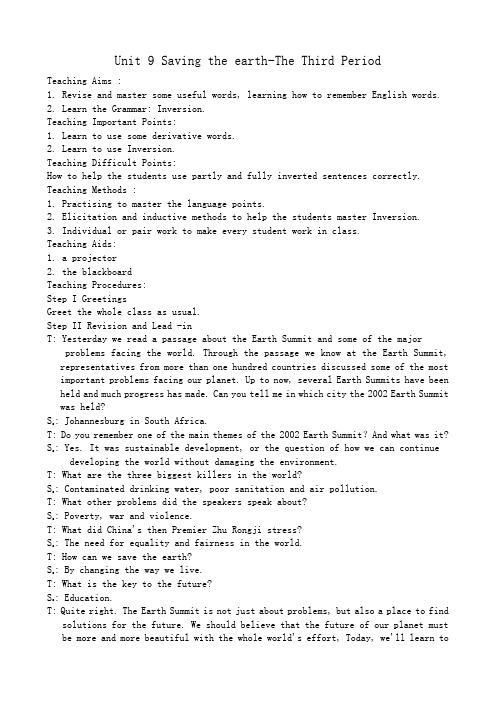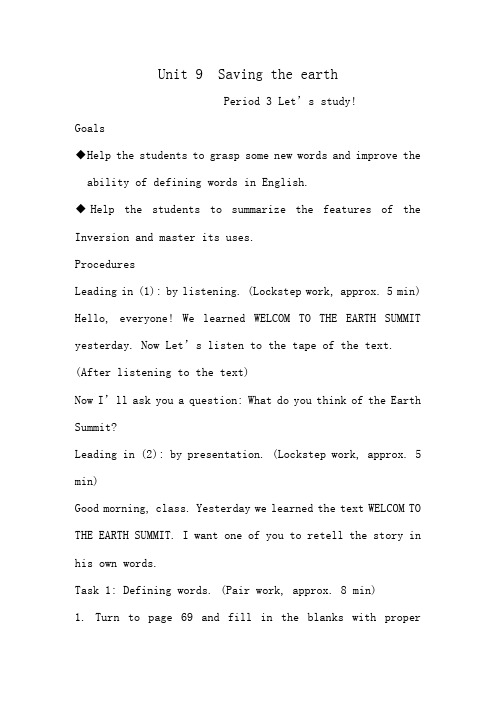Unit-9 高级英语第2册
- 格式:ppt
- 大小:5.27 MB
- 文档页数:245


高级英语 Unit 9 Mark Twain --- Mirror of America翻译&词汇2010年12月19日星期日 19:50第九课马克?吐温——美国的一面镜子(节选)诺埃尔?格罗夫在大多数美国人的心目中,马克?吐温是位伟大作家,他描写了哈克?费恩永恒的童年时代中充满诗情画意的旅程和汤姆?索亚在漫长的夏日里自由自在历险探奇的故事。
的确,这位美国最受人喜爱的作家的探索精神、爱国热情、浪漫气质及幽默笔调都达到了登峰造极的程度。
但我发现还有另一个不同的马克?吐温——一个由于深受人生悲剧的打击而变得愤世嫉俗、尖酸刻薄的马克?吐温,一个为人类品质上的弱点而忧心忡忡、明显地看到前途是一片黑暗的人。
印刷工、领航员、邦联游击队员、淘金者、耽于幻想的乐天派、语言尖刻的讽刺家:马克?吐温原名塞缪尔?朗赫恩?克莱门斯,他一生之中有超过三分之一的时间浪迹美国各地,体验着美国的新生活,尔后便以作家和演说家的身分将他所感受到的这一切介绍给全世界。
他的笔名取自他在蒸汽船上做工时听到的报告水深为两口寻(12英尺)——意即可以通航的信号语。
他的作品中有二十几部至今仍在印行,其外文译本仍在世界各地拥有读者,由此可见他的享誉程度。
在马克?吐温青年时代,美国的地理中心是密西西比河流域,而密西西比河是这个年轻国家中部的交通大动脉。
龙骨船、平底船和大木筏载运着最重要的商品。
木材、玉米、烟草、小麦和皮货通过这些运载工具顺流而下,运送到河口三角洲地区,而砂糖、糖浆、棉花和威士忌酒等货物则被运送到北方。
在19世纪50年代,西部领土开发高潮到来之前,辽阔的密西西比河流域占美国已开发领土的四分之三。
1857年,少年马克?吐温作为蒸汽船上的一名小领航员踏人了这片天地。
在这个新的工作岗位上,他接触到的是各式各样的人物,看到的是一个多姿多彩的大干世界。
他完全地投身到这种生活之中,经常在操舵室里听着人们谈论民间争斗、海盗抢劫、私刑案件、游医卖药以及河边的一些化外民居的故事。



Unit 9 Saving the earth-The Third PeriodTeaching Aims :1. Revise and master some useful words, learning how to remember English words.2. Learn the Grammar: Inversion.Teaching Important Points:1. Learn to use some derivative words.2. Learn to use Inversion.Teaching Difficult Points:How to help the students use partly and fully inverted sentences correctly. Teaching Methods :1. Practising to master the language points.2. Elicitation and inductive methods to help the students master Inversion.3. Individual or pair work to make every student work in class.Teaching Aids:1. a projector2. the blackboardTeaching Procedures:Step I GreetingsGreet the whole class as usual.Step II Revision and Lead -inT: Yesterday we read a passage about the Earth Summit and some of the major problems facing the world. Through the passage we know at the Earth Summit, representatives from more than one hundred countries discussed some of the most important problems facing our planet. Up to now, several Earth Summits have been held and much progress has made. Can you tell me in which city the 2002 Earth Summit was held?: Johannesburg in South Africa.SsT: Do you remember one of the main themes of the 2002 Earth Summit?And what was it? : Yes. It was sustainable development, or the question of how we can continue Ssdeveloping the world without damaging the environment.T: What are the three biggest killers in the world?S: Contaminated drinking water, poor sanitation and air pollution.sT: What other problems did the speakers speak about?: Poverty, war and violence.SsT: What did China's then Premier Zhu Rongji stress?: The need for equality and fairness in the world.SsT: How can we save the earth?: By changing the way we live.SsT: What is the key to the future?: Education.SsT: Quite right. The Earth Summit is not just about problems, but also a place to find solutions for the future. We should believe that the future of our planet must be more and more beautiful with the whole world's effort, Today, we'll learn touse the language points appearing in the passage. First, word study. Then Grammar-Inversion.Step III Preparing for Word study(Teacher shows the following on the screen. )adj. n.lonely _______willing _______responsible _______fair _______equal _______poor _______v. n.kill _______represent _______suffer _______adj. adv.real _______absolute _______successful _______T: Now, please look at the screen and write down the other forms of the given words in each group. Work in pairs first. Then I will check your work.(After a while, teacher checks the students' answers and shows the right ones on the screen.)Suggested answers :loneliness; willingness; responsibility; fairness ; equality; povertykiller; representative; suffering; really; absolutely; successfullyStep IV Word StudyT: Well, now please open your books at Page 69. Look at tile first part in Word study: Complete the sentences with the words in brackets. Change their form if necessary. First, let's study the example.… Now please complete each sentence and discuss your answers with your partner. At the end, we'll check the answers together. Suggested answers :1. killer2. alarming 4. citizen 5. responsibility 6. representatives 7.suffering 8. willingness(Then go on with the second part.)T: Now, let's do the second part. First, you should study the words in the box carefully. Then put them into two categories. At the end, state your reasons. Are you clear?: Yes.SsT: You can begin now. Work in pairs.(After a while, teacher checks their work. )Suggested answers:Adverbs: really, unfortunately, absolutely, especially, successfullyAdjectives: lonely, lively, ugly, lovely, friendlyStep V Presentation(Teacher shows the following sentences on the screen. )1. Conferences like the Earth Summit help people understand that thereexist serious problems and that there is still time to take action.2. Among the speakers was Chinas then Premier Zhu Rongji, who stressedthe need for equality and fairness in the world.3. Not until we know more will we be able to improve the situation.4. Only by changing the way we live can we save the earth.5. Had I known that air conditioners cause so much pollution, I would neverhave bought one.6. A better understanding of the environment is necessary, as is thewillingness to act.7. Without international cooperation, developing countries cannotprosper, nor will sustainable development be possible.T: Now, please look at the sentences on the screen and pay attention to the word order of each sentence. In what way are these sentences different from the usual sentences?: The word order is not “Subject + Verb” but “Verb + Subject” or “Auxiliary/ SsModal + S + V”.(Teacher writes the structures on the Bb.)T: Yes. This kind of sentence is called Inversion, which happens in questions and in a number of other cases. Look at the sentences carefully again, paying attention to the underlined words. In the first sentence, “exist” is used after “there” to express a state for existence like“there be” structure; the second sentence begins with a preposition phrase. In these two sentences, the whole predicate verb comes before the subject. The third sentence begins with a negative adverb; in the fourth sentence, “only” is placed at the beginning of the sentence with an adverbial. In these two sentences, part of the predicate comes before the subject. In most cases, an auxiliary verb or a modal verb comes before the subject and the rest of the predicate verb comes after. If there is no auxiliary or modal, do, does or did should be added. Can you understand?S: Yes.sT: Then look at the fifth sentence and change it into another sentence with the same meaning, which begins with “if”.: If I had known that air conditioners cause so much pollution, I would neverSshave bought one.T: Quite right. In some special forms of unreal conditional clauses, when “if” is left out, part of the predicate like had, should, were should conies before the s ubject. That is to say, inversion can be used instead of “if”. Are you clear about that?S: Yes.sT: Next, look at the last two sentences, To avoid repetition,“as” and “ nor” are placed at the beginning of the sentences which say that people(or thing or situation)are the same as others that have been mentioned. In this case, the structure “as/nor+ auxiliary/modal/do(does, did) + subject” should be used. Besides,“neither” and “so” can be used like “nor”and “as”. Is that clear?(Bb: as/so; neither/nor + aux./mod. / do( does. did) + subject )S: Yes.sT: OK. Now, let's change them into the usual word order sentences. Wang Xia ,you try the first.: It is a special sentence pattern like“There be” structure. “exist” can only Sscome after “there”.T: Yes. Sit down, please. Then the next sentence.: China's then Premier Zhu Rongji was among the speakers, who stressed the need Ssfor equality and fairness in the world.T: …: We will not be able to improve the situation until we know more.S3: We can save the earth only by changing the way we live.S4S: If I had known that air conditioners cause so much pollution, I would never5have bought one.: A better understanding of the environment is necessary, and the willingness to S6act is necessary, too.: Without international cooperation, developing countries can't prosper.S7Sustainable development will not be possible either.Step VI Grammar PracticeT: Well, now please turn to Page 70. Look at the first part ,Grammar: Rewrite the following sentences, beginning with the underlined part. First study the example, and then complete each sentence below. A few minutes later, I'll checkyour work. Begin now.Suggested answers:1. Not until we stop polluting our lakes and rivers, will we have enough drinking water2. Only by learning to live in harmony with nature can we save the earth.3. Only after the meeting did 1 know that air pollution causes almost three milliondeaths every year.4. Only with international cooperation can sustainable development be possible.5. Not only is the Earth Summit a place to talk about problems, but also a place tofind solutions for the future.6. Only with better education will people be able to build a better society in harmonywith nature.7. Seldom do we think of the small changes that we can do to make a big difference.8. Never have I realised that water is so precious.(Then teacher deals part in Grammar.)T: All right. Now let's come to the second part. Complete the following sentences using the words in the box: so, neither, nor, as. At the same time, you should pay attention to the verb form before the subject. First do it individually. Then check your answers with your partner. At the end, I'll ask some of you to readthe whole sentence.Suggested answers:1. so/as have2. neither/nor should3. so/as do4. so/as am5. neither/nor do6. so/as is7. neither/nor8. neither/nor can9. so/as can(After checking the answers, teacher says the following. )T: From these sentences, we know the verb-form after “so, neither, nor, as”should be the same as the verb-form after the first subject. The person and number should agree with its own subject. Is that so?: Yes.SsStep VI Summary and HomeworkT: Now, let's look at what we've learnt in this period. At the beginning of class, we revised the contents of the last class. Then we did some exercises to further study some learnt words in the text. At the end, we learnt the usage of Inversion.To master it better, we also did some exercises. But that's not enough. I hope you can practise more after class. The more you practise, the greater progress you will make. So much for this period. See you tomorrow.: See you tomorrow !SsStep VIII The Design of the Writing on the BlackboardUnit 9 Saving the earthThe Third PeriodI. Word studyII. Grammar: Inversion1. There exist/be...2. Not/Never/Seldom...3. Only + adverbial…4.…so, neither, nor, as+ V +SStep IX Record after Teaching。

Unit 9 Saving the earthPeriod 3 Let’s study!Goals◆Help the students to grasp some new words and improve the ability of defining words in English.◆Help the students to summarize the features of the Inversion and master its uses.ProceduresLeading in (1): by listening. (Lockstep work, approx. 5 min) Hello, everyone! We learned WELCOM TO THE EARTH SUMMIT yesterday. Now Let’s listen to the tape of the text. (After listening to the text)Now I’ll ask you a question: What do you think of the Earth Summit?Leading in (2): by presentation. (Lockstep work, approx. 5 min)Good morning, class. Yesterday we learned the text WELCOM TO THE EARTH SUMMIT. I want one of you to retell the story in his own words.Task 1: Defining words. (Pair work, approx. 8 min)1. Turn to page 69 and fill in the blanks with properderivations.2. Explain the meaning and use of the words: worldwide, die from, surf the net, represent, suffer and impress.3. Make sentences with the words above.Task 2: Studying Inversion. (Individual and lockstep work, approx.10 min)1.Now it’s time for us to learn Inversion. Please turn to page 69, read the seven inversion sentences carefully and see whether you can understand them.2.Help the students find out how inversion is formed and used.① Used in a general question. (Teacher should lay stress on this point, because a lot of inversion sentences are made up of two parts: The inversion part + a general question)② Used in “There be” structure:There are fifty students in our class.There exist some unexpected problems in the world.There lived an old fisherman long ago.③ Used in sentences with “here, there, out, in, up, down, away, etc.” at the very beginning of a sentence.There goes the bell.Here comes the bus.Out rushed the boy.Down flew the bird.Note: If the subject is a personal pronoun, no inversion should be used.Here it is.Out he rushed.④ An adverb, a prepositional phrase or an adverbial clause modified by “only” is put at the very beginning of the sentence:Only then did he fully understand his friend.Only by this means can you reach your goal.Only if you practice speaking English as much aspossible will you be able to make progress in spokenEnglish.⑤ Some negative adverbs, such as hardly, never, not, not only, little, are put at the very beginning of the sentences.Never shall I do it for you.Not until the teacher explained what Inversion was didthe students know what it really was.⑥ When “so” is put at the very beginning of a sentence,it indicates the previous condition suits another person or thing. The structure is: so + be (have/auxiliary verb/modal verb) + subject.He likes football. So do I.She can play the piano. So can my sister.They have visited the farm. So have we.⑦ When “neither” or “nor” is put at the very beginning of a sentence, it indicates the previous condition suits another person or thing. The structure is: neither (nor) + be (have/auxiliary verb/modal verb) + subject.She has never been to Australia. Neither have I.I didn’t show any interest to the subject. Nor did Jack.⑧ To keep balance of the sentence, or to lay stress on the predicative or the adverbial, or to make the context join better.In these oceans live huge numbers of a small fish just5 cm long.From the speaker on the wall comes the doctor’s voice,“Good morning.”Yesterday they visited a middle school, in the middleof which exists a very big playground.3.Ask the students to choose the best answers.① I like sports and ______ my brother.A. so doesB. so isC. so canD. so likes② No sooner had he finished his talk ______ he was surrounded by the workers.A. asB. thenC. thanD. when③ Helen doesn’t like milk and ______.A. so I don’tB. so don’t IC. either I doD. neither do I④ Only in this way ______ progress in your English.A. you makeB. can you makeC. you be able to makeD. will you able to make⑤- Did you enjoy that trip?- I’m afraid not. And ______.A. my brother don’t eitherB. my classmates don't tooC. neither do my classmatesD. neither did my classmates⑥- John won first prize in the contest.— ______.A. So he didB. So did heC. So he did tooD. So did he, too⑦ After that we never saw her again, nor ______ from her.A. did we hearB. we heardC. had we heardD. we have heard⑧ Not until the early years of the 19th century ______ what heat is.A.man did knowB. man knewC. didn’t man knowD. did man know⑨ Not until I began to work ______ how much time I had wasted.A. didn’t I realizeB. did I realizeC. I didn’t realizeD.I realize⑩- Do you know Jim quarreled with his brother?- I don’t know, ______.A. nor don’t I careB. nor do I careC. I don’t care eitherD. I don’t care alsoKey: 1 – 5 ACDBD ; 6 – 10 AADBB4.Ask the students to finish the exercises 1 & 2 on page 70.。
Unit 9 Saving the earth-The Fourth PeriodTeaching Aims:1. Learn and master the following words:defend, incorrect, affect, advise2. Train the students listening and speaking abilities.3. Learn to write an evaluation paragraph.Teaching Important Points:1. Master the useful words and phrases appearing in this period.2. Learn to support an opinion both in speaking and writing.Teaching Difficult Point:How to help the students finish each task and improve their skills to use language. Teaching Methods :1. Oral practice to train the students' speaking ability.2. Written work to train the students' writing ability.3. Individual, pair or group work to make every student work in class.Teaching Aids:1. a tape recorder2. a projector4. the blackboardTeaching Procedures:Step I GreetingsGreet the whole class as usual.Step II Revision and Lead-inT: Yesterday, we learnt the use of Inversion and did some exercises. Can youtell me the difference between inverted sentences and usual sentences? WuLi, would you like to have a try?S:Yes. In an inverted sentence, part ofthe predicate or the whole predicateles before the subject. In a usual sentence, the predicate es after thesubject.T: Quite right. Sit down, please. Then for what reasons do you think Inversion is used? Any volunteer?: I think Inversion is used for two reasons. One for the need of the grammatical S2structure of a certain type of sentence the other for emphasis of a certain part of a sentence.T: Quite right. Now, let's do an exercise, Look at the screen and write your answers on a piece of paper. Then I'11 check the answers with the whole class.(Teacher shows the following on the screen. )Rewrite the following sentences usingInversion.1. We can finish the work on time onlyby seizing every minute.______ ______ _______ _______ ________ _______ _______finish the workon time.2. I have never heard such nonsense in all my life._________ _________ _________ heard such nonsense in all my life.3. A piece of paper was folded in the pocket.______ ______ ______ _______ _______ a piece of paper.4. He little realizes how important thisheart operation is.______ _______ _______ _______ howimportant this heart operation is.5. Churchill was not only a statesman but also a poet.______ ______ _______ Churchill astatesman but also a poet.Suggested answers:1. Only by seizing every minute can we2. Never have I3. Folded in the pocket was4. Little does he realize5. Not only wasT:Well done. Besides, we've read a passage in this unit about the Earth Summit and environmental problems andsolutions. What words we've learnt inthis unit can help us describe environment problems and solutions?: Sustainable development, contaminated drinking water, poor sanitation, airSspollution, killer, poverty, war, violence, equality, fairness, take action, make changes, education, in harmony withnature...T: Oh. So many. I hope you can remember and use them. We know the Earth Summit mainly talks about environment problems and solutions. Expertsfrom all over the world are wele tothe Earth Summit, speaking about different topics and discussing new ways to solve old problems. Today we are going to listen to the voices of theEarth Summit. And we'll talk about the environment problem again. First, let’s learn the new words in this period.(Teacher shows the new words on the screen and gives brief explanations.)( Bb: alternative—alternate; defend against/from; incorrect--correct;affect/effect; advise sb. (not) to dosth. ,advise doing sth. )Step III Listening and SpeakingT: Well, now please open your books at Page 71. Look at the first part in Listening and Speaking: Listen to the speeches from the Earth Summit and plete the outlinesbelow, I'll play the tape twice continuously. Listen carefully and finish your task. At theend,I'll check your answers.(After listening, teacher introduces the next task.)T: Well done. You've understood the speeches exactly. Do you agree with what they are saying? Work in pairsto talk about this question. Write down your thoughts, ments, opinions and questions about what they said. Prepare for a few minutes.Thenwe'll go on with the next task. (A few minutes later.)T:OK. Now you have a chance to makeyour own speech. Use your notes and think about what you would like to say. First, write an outline, and then give the speech in class. Make sure that you are ready to answer questions and defend your argument.Are you clear?: Yes.SsT: You can begin to prepare tot it now.(Another few minutes later.)T:Are you ready?: Yes.SsT: OK. Now let's begin our speech. Each student should listen to your classmate's speeches carefully and get ready to ask them questions. Who'd like to be the first to give your speech? Any volunteer7S:…(One of the students stands up andgives his speech. The others go on. After the speeches, teacher shows the following on the screen. )Tips for preparing a speech:Knowing how to give a good speech is a useful skill. If you want to givea goodspeech, there are a few things you need to consider.I. Think about your audiencea. Who will listen to your speech?b. What are they interested in?c. What do they want to know?d. What do they already know?Outlines like these will help you decide what you are going to say.II. Prepare and practisea. Research your topic carefully and organise the material,b. Before you give the speech, practise in front of a mirror or togetherwith a friend.T: Your speeches were all made successfully, but in order you can make a better speech,I give you some advice onpreparing a speech.Look at the screen. Let's studytogether.…Step IV WritingT: As we all know, environment problems are being more and more seriouswith the development of modern agriculture and industry. Among all the problems, which do you think is the most serious one? Why do you thinkso? What do you think should be done to solve it? Now write a paragraph to tell your reader about these questions.(Teacher writes the questions on theBb. )T: You can prepare your paragraph as follows: First, write a sentence that states your opinion, for example,“I think that air pollution is the most serious problem because it does great harm to ourhealth. 〞Then list as many reasons as possible.Finally, use the sentences toorganise your paragraph. Are you clear?: Yes.SsT: Well. I'll show you some words and phrases on the screen. You can refer tothem. After finishing your paragraph, use the check list in Unit 2 to check it for errors and mistakes. Are you clear?S: Yes.s(Teacher shows the following on thescreen and the students begin towork.)Step V Summary and HomeworkT: You all did very well in class. Now let's see what we've done in this period. First.we've revised the previous contents, including the text and the grammar. Second, we've done some listening and speaking. Then we've learnt to write an evaluation paragraph. All these activities center onthe subject “environment problemsand absolution 〞. Everyone shouldmake an effort to take care of ourplanet. Do you think so?: Yes.SsT: Besides, we've learnt some useful words and phrases, such as… After class, please practise more to improve your ability to use language. So much for today. See you tomorrow!S: See you tomorrow!sWhat do you think is the most serious one? Why do you think so?What do you think should be done tosolve it? Step VII Record after Teaching。